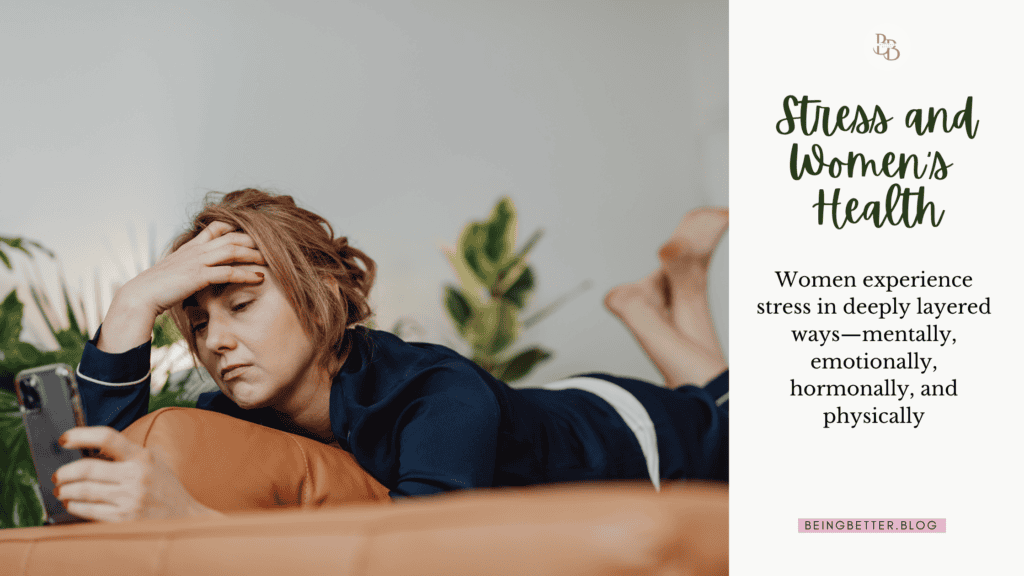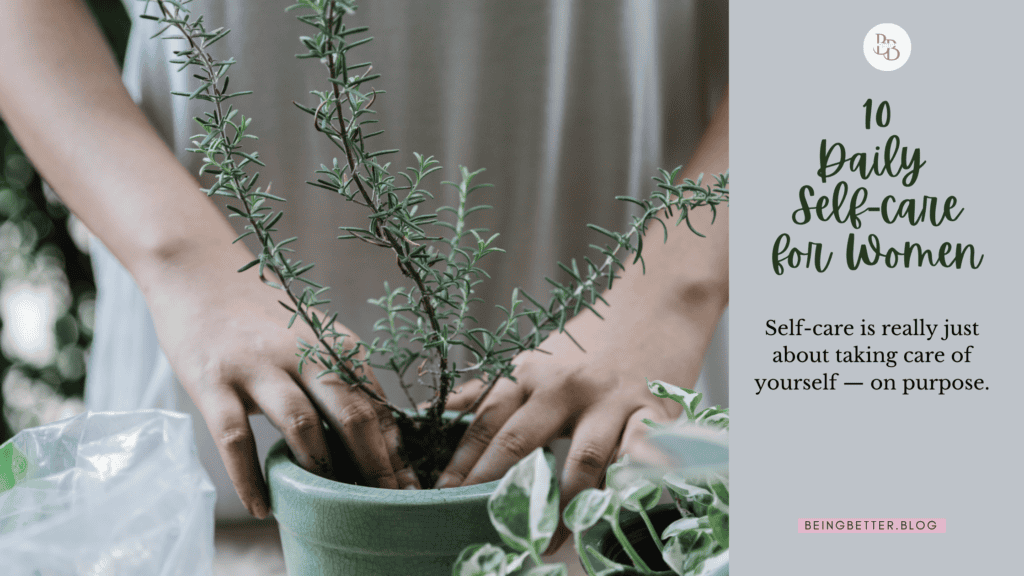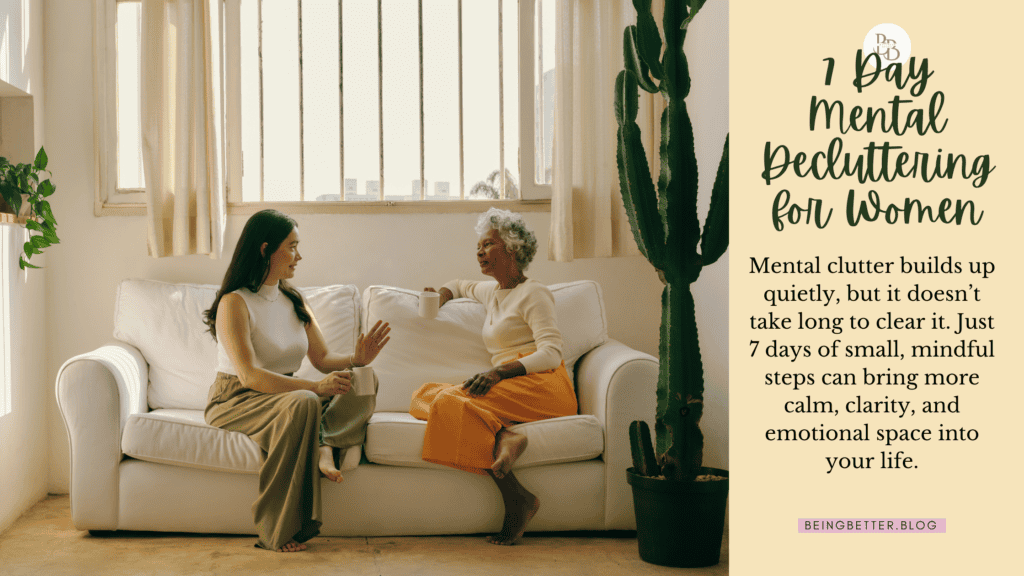Table of Contents
Why Stress Feels Different for Women
Ever feel like you’re carrying the weight of the world on your shoulders—even when everything “looks” fine from the outside? Like you’re juggling roles, expectations, emotions, and still trying to keep it all together with a smile?
You’re not alone.
Stress doesn’t just knock on our door—it sneaks in quietly, shows up in our moods, our sleep, our energy levels, and even our hormones. And for women, it tends to hit differently. From monthly cycles to emotional labor and the constant pressure to be “everything to everyone,” stress can take a deeper toll—mentally, physically, and emotionally.
But here’s the good news: once you understand how stress really affects your body and mind, you can take simple, loving steps to manage it—and even feel more in control of your life.
In this article, we’ll walk through:
- How stress specifically impacts women
- And gentle, effective ways to manage it—step by step, from a place of self-love and awareness.
Whether you’re a working woman, a student, a mom, or just a human trying to find balance, you deserve peace!!! Let’s dive in and make that your new normal.
Signs You Might Be Stressed (Even If You Don’t Realize It)
Sometimes stress doesn’t show up with flashing lights. It hides behind everyday feelings, quiet habits, or even things we brush off as “just tired” or “just one of those days.” But your body and mind always try to tell you when something’s off.
Here are some common signs of stress in women—and if you recognize a few, it might be time to slow down and give yourself a little extra care.
🧠 Mental & Emotional Signs
- Feeling overwhelmed easily – Like even small tasks feel like too much
- Irritability or mood swings – Snapping at loved ones without meaning to
- Racing thoughts – Your mind won’t slow down, especially at night
- Constant worry or overthinking – Making up worst-case scenarios in your head
- Lack of motivation – Things you once enjoyed now feel like chores
- Feeling disconnected – Like you’re there but not really present
😴 Physical Signs
- Tired but wired – Exhausted all day, but can’t sleep at night
- Frequent headaches or muscle tension – Especially in the neck, shoulders, or jaw
- Digestive issues – Bloating, indigestion, or appetite changes
- Unexplained weight changes – Either gain or loss, without trying
- Skin flare-ups – Acne, dryness, or sudden sensitivity
- Irregular periods – Skipped cycles, heavy bleeding, or intense PMS
💭 Behavioral Signs
- Procrastination or avoidance – Pushing things away instead of facing them
- Mindless scrolling or emotional eating – Trying to numb feelings
- Withdrawing from people – Ignoring calls, skipping plans, needing space
- Crying more easily – Tears come faster, even if you’re not sure why
- Saying “I’m fine” when you’re really not – Sound familiar?
If you nodded “yes” to several of these, don’t panic. You’re not broken—you’re human. These are just signs that your mind and body are asking for rest, love, and some space to breathe.
How Stress Specifically Affects Women – 8 Deep Impacts Explained
1. Hormonal Fluctuations Make Stress Hit Harder
Women go through natural hormonal shifts every month due to the menstrual cycle. Estrogen and progesterone levels rise and fall, influencing mood, energy, and even how the body handles stress.
But when you’re under constant stress:
- Cortisol (stress hormone) starts interfering with reproductive hormones.
- You may experience irregular periods, missed cycles, or more painful PMS.
- Conditions like PCOS, thyroid imbalances, and endometriosis may flare up.
- During pregnancy, postpartum, and perimenopause, stress worsens symptoms like fatigue, anxiety, and mood swings because your body is already in a state of hormonal change.
So even if you’re mentally trying to stay calm, stress shows up physically through your cycle and hormonal health.
2. Women Have a Different Stress Response: “Tend and Befriend”
Unlike men who generally respond to stress with “fight or flight”, women have a different built-in coping mechanism called “tend and befriend.”
What does this mean?
- Women are more likely to nurture others and seek emotional connection under stress.
- This happens due to the release of oxytocin, a calming hormone linked to bonding and caregiving.
While this instinct to care for others is beautiful, it often leads women to:
- Neglect their own stress symptoms
- Keep functioning outwardly while burning out inside
- Feel guilty for saying “no” or needing rest
This is why emotional burnout is so common in women—even if they’re managing everything “well” on the surface.
3. Increased Risk of Mental Health Challenges
Women are nearly twice as likely as men to develop anxiety and depression, and stress is one of the biggest contributors.
Why?
- Female brains are more sensitive to fluctuating cortisol and serotonin levels.
- Women often juggle multiple roles—career, caregiving, and emotional support for others—without enough time for themselves.
- They are also more likely to internalize stress, leading to overthinking, self-criticism, or emotional exhaustion.
This emotional toll can build up silently and lead to chronic mental fatigue, low mood, and a loss of motivation or interest in life.
4. Disrupted Sleep Patterns
Sleep and stress are deeply connected—and for women, that relationship is even more complicated.
Here’s how stress impacts sleep in women:
- Racing thoughts, mental overload, and nighttime worry make it hard to fall asleep.
- Hormonal changes (like premenstrual dips in progesterone or menopause-related hot flashes) disrupt sleep quality.
- Caregiving responsibilities, such as tending to babies or elderly family members, also add to sleep interruptions.
As a result, women are more prone to insomnia, non-restorative sleep, and daytime fatigue, which only worsens the stress cycle.
5. Physical Symptoms Show Up Stronger
Stress doesn’t just stay in the mind—it affects the body, and in women, it often shows up as:
- Frequent headaches or migraines
- Muscle tension, especially in the neck and shoulders
- Bloating, cramps, or digestive distress
- Acne or skin flare-ups
- Hair thinning or hair loss
Women tend to carry emotional stress physically—sometimes without even realizing it’s stress-related. They might visit doctors for gut or skin issues without knowing stress is the root cause.
6. Changes in Eating Habits & Emotional Eating
Women under stress are more likely to turn to comfort eating, especially sugary or high-carb foods.
Why?
- Cortisol increases appetite and cravings, especially for “quick energy” foods.
- Emotional overwhelm often leads to mindless snacking, binge eating, or skipping meals altogether.
- Many women also link food to emotional comfort, which creates a pattern of emotional eating during difficult times.
Over time, this can affect metabolism, lead to weight gain, worsen hormonal balance, and cause guilt or shame around eating.
7. Impact on Reproductive and Sexual Health
Stress can have a direct effect on your reproductive system, especially if it’s ongoing.
Some key impacts:
- Reduced libido or sexual interest due to fatigue, mental load, or body discomfort
- Irregular ovulation or skipped periods, which can interfere with fertility
- Worsening symptoms of PMS, PCOS, or menopausal changes
- Delayed recovery postpartum, especially if you’re not supported emotionally
This is why so many women experience unexplained reproductive issues during stressful life periods—they’re not separate problems; they’re stress-related.
8. Invisible Load & Societal Pressure
This is one of the most overlooked but powerful forms of stress women carry.
Women are often expected to:
- Be productive at work
- Nurture the family
- Look good and stay fit
- Be emotionally available to others
- Stay positive and strong no matter what
This creates an invisible pressure to constantly perform and please others—leading to:
- Chronic self-doubt
- Perfectionism and comparison
- Feeling like “not enough,” even when doing everything
The mental weight of these expectations can be just as exhausting as physical tasks, leaving women drained without even realizing why.
Women experience stress in deeply layered ways—mentally, emotionally, hormonally, and physically. It’s not about being weak. It’s about being human in a world that often forgets how much you carry.
Recognizing these impacts is the first step to healing and creating a life where your peace, health, and balance come first. Let’s dive into some of the stress management techniques after that!
How to Manage Stress – Step-by-Step
Life doesn’t slow down for us, does it? But the good news is, we can learn how to slow down within. These techniques aren’t just tips but gentle reminders for your everyday life. You don’t have to do all of them. Pick a few that feel right, and try them one by one.
1. Practice Daily Mini Self-Care Moments
- Set aside just 10–15 minutes a day just for yourself.
- Choose simple calming activities: deep breathing, sipping tea quietly, journaling, stretching, or even doing nothing.
- Decide a specific time (like 9 AM after breakfast or 9 PM before bed).
- Set a soft timer.
- Switch off distractions (phone notifications off!).
- Focus only on you—your breath, your thoughts, your peace.
Benefits:
- Reduces cortisol (stress hormone)
- Makes you feel seen, loved, and grounded
- Helps prevent burnout by refilling your energy cup
I started by just drinking my tea in silence—no phone, no multitasking. It felt small but powerful. Those 10 minutes felt like someone gave me a hug. That “someone” was me.
2. Set Boundaries (and Keep Them!)
- Say no when something drains you.
- Respect your limits—even if others don’t understand right away.
- Write down what things overwhelm you (people, tasks, events).
- Choose 1–2 small situations to start practicing “no”.
- Use clear but kind phrases:
- “I’m not able to take that on right now.”
- “Thank you for asking, but I need to rest.”
- “I’m not able to take that on right now.”
- Stick to your decision—don’t explain too much or over-apologize.
Benefits:
- You regain control over your time and energy
- Builds emotional safety
- Reduces resentment, guilt, and people-pleasing patterns
3. Nourish Your Body Gently
- Eat foods that support your mood and reduce stress and inflammation.
Step-by-step:
- Include slow-digesting carbs (oats, quinoa, sweet potato) to keep energy stable.
- Add healthy fats (avocados, nuts, seeds) for brain support.
- Use calming teas like chamomile, tulsi, or peppermint after meals.
- Eat slowly and mindfully—chew well, and avoid screens while eating.
Benefits:
- Stabilizes blood sugar and moods
- Supports hormone balance
- Prevents emotional eating spirals
4. Create a Wind-Down Night Routine
- Prepare your body and brain to rest properly.
Step-by-step:
- Choose a consistent bedtime window (e.g., 10–10:30 PM).
- Avoid screens 1 hour before bed (try dim lights and soft music).
- Try light stretching or a warm shower to relax your body.
- Journal or list 3 things you’re grateful for.
- Read something light—or do deep breathing until you feel sleepy.
Benefits:
- Improves sleep quality
- Lowers nighttime anxiety
- Recharges you for the next day
5. Connect with Someone Safe
- Talk to someone who listens without judgment.
Step-by-step:
- Identify 1–2 people you trust (friend, sister, therapist, or support group).
- Reach out weekly or when you feel off.
- Don’t be afraid to say: “I just need someone to listen today.”
- Return the favor—connection is a two-way street.
Benefits:
- Releases emotional buildup
- Creates validation and empathy
- Makes you feel less alone
6. Try Mindfulness or Deep Breathing
- Use simple mindfulness tools to calm your nervous system.
Step-by-step:
- Sit or lie down comfortably.
- Inhale deeply for 4 seconds, hold for 4, exhale for 6.
- Repeat 5–10 rounds.
- Or try focusing on sounds around you for 1 full minute (no judgment, just noticing).
Benefits:
- Slows heart rate
- Calms the mind and reduces racing thoughts
- Builds mental clarity
I keep a sticky note by my laptop that says “Breathe.” Sounds silly, but it helps me pause—especially during stressful workdays.
7. Move Your Body in Ways You Enjoy
- Release built-up stress through joyful movement.
Step-by-step:
- Choose what feels good—walk, yoga, dance, swimming, cycling.
- Set a goal of 15–30 minutes daily, or just move when you feel tension building.
- Don’t aim for weight loss—focus on how you feel after.
- Even stretching in bed counts on low-energy days.
Benefits:
- Boosts happy hormones like serotonin and endorphins
- Reduces muscle tension
- Improves energy and sleep
8. Journal It Out
- Use writing as an emotional release.
Step-by-step:
- Grab a notebook or open a notes app.
- Try one of these prompts:
- “What’s really on my mind right now?”
- “What do I need today?”
- “What would I say to my younger self?”
- “What’s really on my mind right now?”
- Don’t edit or judge—just let the words flow.
- Close your journal with a positive note like: “I’m doing my best.”
Benefits:
- Clears mental clutter
- Helps understand and process emotions
- Builds self-awareness and emotional strength
I started journaling at night during my pregnancy when I felt overwhelmed. It helped me sleep better and made me feel heard by myself!
Stress is part of life, but it doesn’t have to own you. With just a few small, loving steps each day, you can build your own peaceful rhythm. Think of these habits like tiny seeds—they grow slowly, but beautifully.
🌿 Start small. Stay kind to yourself. You’re doing better than you think.



